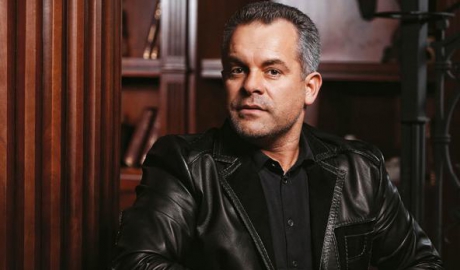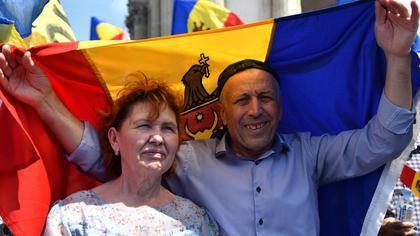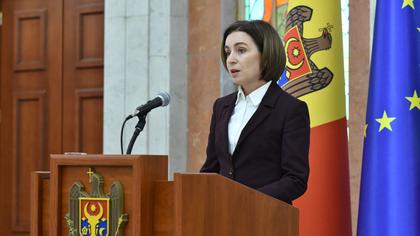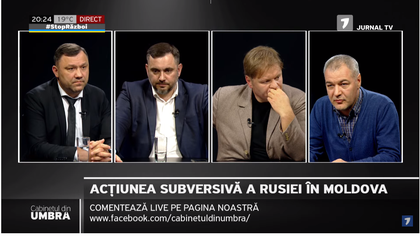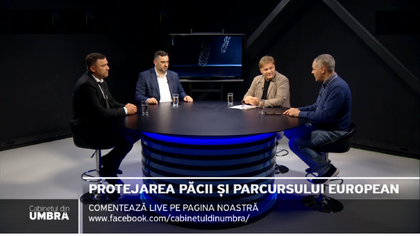De aproape un deceniu, cel mai controversat oligarh pe care l-a ştiut Republica Moldova îşi face mendrele nestingherit, ajungând de sub protecţia guvernării comuniste direct în prezidiul Parlamentului. În timp ce justiţia internaţională îl cercetează de ani de zile şi dă alarma, pe fonul nenumăratelor dezvăluiri despre ilegalităţile comise de acesta, Vladimir Plahotniuc s-a făcut comod într-un nou fotoliu de deputat.
Plahotniuc a obţinut influenţă încă de prin anii 2003-2004, când a ajuns sub umbrela preşedintelui comunist Vladimir Voronin. În acea perioadă, potrivit unor politicieni, Plahotniuc, ferit de ochii publici, era numit „cardinalul din umbră” al familiei Voronin. În consecinţă, sistemul construit de Voronin, timp de opt ani de guvernare comunistă, care putea fi acţionat pentru a distruge pe oricine doar acţionând un „buton”, astăzi este controlat de Plahotniuc. Or, odată cu venirea la putere, PCRM a lansat o perioadă de persecutare a tuturor celor care s-au împotrivit sistemului. Subordonând justiţia, poliţia şi serviciile secrete, Voronin a fost numit „ultimul dictator comunist din Estul Europei”. Clanul lui Voronin făcea legea în RM, unde corupţia atinsese cote enorme şi totul era de vânzare: de la decizii judecătoreşti şi până la eliminarea concurenţilor în afaceri. Plahotniuc, aflându-se în coasta lui Voronin în tot acest timp, îşi satisfăcea din umbră interesele personale, de la eliminarea agenţilor economici care îl deranjau şi până la comandarea proiectelor de legi. Într-un interviu de acum câţiva ani, Oleg Voronin, fiul liderului comunist, declara că toate afacerile de care a fost acuzat că le-a preluat cu forţa în perioada guvernării comuniste „se află la Plahotniuc”, care „a pus mâna pe toate, într-o manieră specifică lui”.
Şirul isprăvilor lui Plahotniuc este impunător, începând cu preluarea abuzivă a afacerilor din RM şi până la hărţuirea şi arestarea tuturor care i-au stat în cale. A preluat forţat gestiunea Combinatului de produse cerealiere şi arestul lui Victor Moraru, cel care gestiona anterior această întreprindere. A acaparat Combinatul de producere a pâinii, Franzeluţa, şi a comandat arestul directorului general, Spiridon Danilescu. A pus mâna pe Combinatul de producere a cărnii, Carmez, şi a stat în spatele arestului directorului general Anatol Câşlaru. Tot Plahotniuc a preluat cu forţa Combinatul de producere a divinului Aroma şi l-a terorizat pe directorul general Simion Leva, care a devenit fugar împreună cu fiul său. Printre afacerile acaparate de Plahotniuc se numără şi compania de securitate Tantal, urmată de arestul directorului, dar şi magazinul Gemenii, unde a comandat dosare penale pe numele conducerii şi acţionarilor, ca să-i reducă la tăcere. În perioada guvernării comuniste a preluat controlul şi a instituit monopol prin controlarea fluxurilor de mărfuri şi bani la importul cărnii, peştelui, energiei electrice, telefoanelor mobile, computerelor, mobilei etc.
Cazul Magniţki şi cele 450 de milioane de dolari, spălate prin intermediul Băncii de Economii, caz de pe urma căruia au profitat Veaceslav Platon şi Grigore Gacichevici, iar Plahotniuc a ţinut acoperişul acestei spălări de bani, prin folosirea CCCEC şi PG; furturi din bugetul de stat prin hotărâri de judecată, tendere şi alte tertipuri; gestionarea generală a atacului raider asupra ÎS Registru; controlarea fluxului de la bani la Metal Feros, Moldtelecom, Air Moldova, Aeroportul Chişinău, Moldova-Gaz, ÎS Registru şi la alte întreprinderi de stat, preluarea frauduloasă a mai multor întreprinderi şi valori de stat, precum hotelul Codru, hotelul Naţional, insulele „La izvor”, cafeneaua Parlament, cafeneaua Guguţă; atacurile raider şi condamnarea oamenilor nevinovaţi: cazurile Victoriabank, Banca de Economii, ASITO, Victoria Asigurări, Moldova Agroindbank, Universalbank.
În spatele acestor cazuri a stat Plahotniuc, pentru că toate acestea au avut loc printr-un control fără precedent al justiţiei din Republica Moldova şi al instituţiilor de stat. Plahotniuc a instituit un stat captiv prin controlul la Curtea Constituţională, Consiliul Superior al Magistraturii, Curtea Supremă de Justiţie, Curtea de Apel, judecătoria Buiucani, Consiliul Superior al Procurorilor, Procuratura Generală, Procuratura Anticorupţie, Centrul Naţional Anticorupţie, Consiliul Naţional de Integritate, Comisia Naţională a Pieţei Financiare, ANRCTI, ANRE, ANPC, Consiliul Coordonator al Audiovizualului şi folosirea acestor instituţii în scop personal.
Recent, în cadrul unei emisiuni, colonelul în rezervă Chiril Moţpan, fost şef al direcţiei relaţii publice a Ministerului de Interne, a dezvăluit că la Procuratura Generală şi la MAI se află o listă cu toate afacerile lui Vladimir Plahotniuc, pentru ca organele de drept să le ofere protecţie şi să nu le „atingă”.
Pentru a scăpa basma curată şi a-şi asigura spălarea imaginii, oligarhul a pus mâna pe un şir de instituţii mass-media: control instituit la CCA, preluare ilegală prin fraude sau şantaj a ORT-ului (Prime TV), a TVR-ului, controlarea frecvenţelor TV: Publika TV, Moldova 1 (indirect), control din umbră la măsurătorul audienţei TV – AGB – şi controlul total asupra pieţei publicitare.
Nimic din toate acestea nu ar fi putut avea loc fără controlarea instituţiilor în stat, cum ar fi Procuratura Generală, CCCEC, BNM, CNPF şi niciun ac nu ar trece prin aceste instituţii fără consimţământul lui Plahotniuc. Mai mult, cel care a controlat şi controlează în continuare justiţia din RM, cel care a stat în spatele atacurilor raider din 2010 şi 2011 asupra sistemului bancar de la noi din ţară, are la cheremul său o serie de judecători de la CSJ (Mihai Poalelungi), CSM (Nichifor Corochii). Totodată, Plahotniuc a ţinut şi ţine în continuare sub papuc toate structurile de drept din ţară, începând cu Procuratura Generală, Centrul Anticorupţie, Serviciul de Informaţie şi Securitate, instituţii care în 2010 şi 2011 l-au protejat pe Plahotniuc în timpul atacurilor raider.
Totodată, Plahotniuc a controlat şi controlează organele politice şi cele de reglementare, care au participat activ la atacurile raider din 2010-2011 asupra sistemului financiar al RM, precum Banca Naţională şi Comisia Naţională a Pieţei Financiare. Or, atacurile raider sunt un capitol aparte. În vara anului 2010, mai mulţi acţionari ai Victoriabank au fost deposedaţi de acţiunile lor prin hotărâri judecătoreşti ascunse. În vara anului următor, în mod identic, mai multe pachete de acţiuni ale Băncii de Economii, Moldova Agroindbank, Victoriabank şi ale societăţii de asigurări ASITO au fost preluate de companii dubioase, înregistrate în străinătate.
Ulterior, prin intermediul unui memoriu public, oamenii de afaceri Victor Ţopa şi Viorel Ţopa au informat autorităţile statului, dar şi organizaţiile internaţionale, despre atacurile de tip raider, solicitând investigarea cazului şi condamnarea autorilor. În rezultat, faptul că Plahotniuc a fost organizatorul şi beneficiarul atacurilor raider din 2010 – 2011 a fost dezvăluit de Curtea de Justiţie din Londra, care a obligat mai multe companii off-shore să dezvăluie identitatea celor care au intrat ilegal în posesia acţiunilor furate de la băncile şi companiile din RM. În urma percheziţiilor la aceste companii a ieşit la suprafaţă faptul că cel care a avut de câştigat de pe urma atacurilor a fost Plahotniuc.
Este de menţionat şi dubla identitate a prim-vicepreşedintelui PD, care a ieşit la iveală, după ce presa a relatat că oligarhul, care deţine şi cetăţenie română, a solicitat autorităţilor de peste Prut să-i fie schimbat numele din Vladimir Plahotniuc în Vlad Ulinici. Acesta nu a anunţat autorităţile Republicii Moldova despre schimbarea identităţii în România, deşi legislaţia naţională prevede că acest lucru trebuie să fie făcut în maximum 6 luni de la schimbarea numelui. Cu toate acestea, autorităţile de la Chişinău nu au întreprins nicio acţiune de sancţionare a afaceristului.
Printre scandalurile de proporţii, cu ecouri şi peste hotarele ţării, în care figurează Plahotniuc, este şi monitorizarea sa de către Interpol. Oligarhul a fost monitorizat de Interpol din 2007 până în 2012, însă a minţit public, negând acest lucru, până în momentul în care informaţia a fost confirmată de către ministrul de Interne, Dorin Recean. Interpolul a început monitorizarea lui Plahotniuc încă în anul 2007, pentru legăturile acestuia cu gruparea criminală Solntsevskaya. Biroul Interpol de la Roma a solicitat atunci punerea la dispoziţie a informaţiilor despre 23 de subiecţi implicaţi în respectivele afaceri, numele lui Plahotniuc figurând în acea listă. În urma investigaţiilor, Interpol a scos la iveală afaceri ilegale de proporţii cu imobiliare, în spatele cărora au stat operatori financiari străini, legaţi cu principalele grupări oligarhice din Rusia, precum Solntsevskaya, iar banii spălaţi prin asemenea operaţiuni proveneau din furturi, eschivare de la impozite şi alte activităţi ilegale.
Recent, oligarhul din PD a fost deconspirat din nou, după ce şi-a ascuns averea, mai exact, o casă de toată frumuseţea pe malul lacului Geneva, pe care nu a indicat-o însă în declaraţia sa de avere pe vremea când era parlamentar. Vila oligarhului, situată în oraşul Sciez din Franţa, are două nivele şi trei garaje, iar pe cutia poştală de la poarta locuinţei este inscripţionat numele soţiei lui Plahotniuc, Oxana Childescu. Totodată, în presă a apărut şi un document eliberat de autorităţile din oraşul francez Sciez, care demonstrează că Vladimir Plahotniuc şi-a cumpărat locuinţa în anul 2008, cu suma de 3 milioane de euro. Casa din Franţa nu este singura locuinţă pe care prim-vicepreşedintele PD nu a indicat-o în declaraţia de avere. Anterior, publicaţia „Adevărul” a scris că omul de afaceri ar avea o casă luxoasă şi în cartierul rezidenţial din Pipera, lângă Bucureşti.
Totodată, jurnaliştii de la RISE Moldova au publicat imagini cu Plahotniuc la vila sa din Franţa. În fotografiile făcute în perioada 2012-2013 apar mai multe dintre persoanele de încredere ale oligarhului moldovean, precum finul său, Andrian Candu, şi cumnatul său, Iurie Luncaşu, care este căsătorit cu sora lui Plahotniuc, Elena. Anterior, Grigore Petrenco a declarat că Luncaşu ar fi omul de legătură între prim-vicepreşedintele PD şi liderul comuniştilor, Vladimir Voronin.
Unul dintre cele mai grave cazuri care au zguduit RM, cu Plahotniuc în unul dintre rolurile principale, rămâne a fi vânătoarea din Pădurea Domnească, de pe 23 decembrie 2012, când a fost împuşcat mortal omul de afaceri Sorin Paciu. Tragedia, care a scos la iveală toate lacunele instituţiilor de stat din RM, a fost tăinuită de toţi participanţii la vânătoare timp de două săptămâni. La vânătoarea fatală a luat parte un şir impunător de politicieni, oameni de afaceri, judecători şi procurori, dintre care o mare parte - din anturajul lui Plahotniuc. Vedeţi în continuare o parte dintre participanţi, cu funcţiile pe care le deţineau în acel moment: procurorul general, Valeriu Zubco; judecătorul Ion Pleşca, preşedinte al Curţii de Apel Chişinău; judecătorul Gheorghe Creţu, vicepreşedinte al Curţii de Apel Chişinău; directorul Agenţiei de Stat „Moldsilva”, Ion Lupu, directorul Rezervaţiei Naturale „Pădurea Domnească”, Denis Irimciuc; directorul I.S. „Registru”, Serghei Răilean. Alături de judecători şi procurori la vânătoarea fatală din Pădurea Domnească au fost mai mulţi oameni de afaceri care administrează companii controlate de controversatul om de afaceri şi deputat PD, Vladimir Plahotniuc. Printre aceştia: Ghenadie Sajin, director al „FinparInvest”; Serghei Latîş, director al „Media Production SRL”; Boris Buga, director al filialei „Tirex-Petrol”; oamenii de afaceri Valeriu Guzun şi Iurie Nastas.
După ce omorul din Pădurea Domnească a ieşit la iveală, Parlamentul a format o comisie de anchetă pentru a cerceta crima. La trei săptămâni de audieri şi reconstituiri, membrii comisiei au confirmat că omorul lui Sorin Paciu a fost tăinuit şi că instituţiile de drept, în frunte cu procuratura condusă pe atunci de Valeriu Zubco, au muşamalizat cazul, au distrus şi falsificat probe, au intimidat martori şi au manipulat opinia publică. Totul - pentru a salva reputaţia şi a-i proteja de justiţie pe unii politicieni şi magistraţi. Mai mult, în presă s-a scris că Dorin Damir, finul lui Plahotniuc, s-a deplasat în Pădurea Domnească imediat după omor pentru a şterge urmele vânătorii sângeroase, soldată cu moartea lui Sorin Paciu.
Ajuns din nou în Parlament, Plahotniuc se ascunde sub paravanul integrării europene, la fel ca şi ceilalţi guvernanţi, care îi sunt complici, tacit sau explicit.
Varianta în limba engleză o puteţi accesa aici.
For almost a decade, the most controversial oligarch that Republic of Moldova have ever known, is satisfying freely his caprices, getting from communist government protection directly into the Parliament presidium. While the international justice investigates him for years and sounds the alarm, on the background of the countless revelations about the illegalities he committed, Vladimir Plahotniuc made himself comfortable in a chair of member of the Parliament.
Plahotniuc gained influence in 2003 – 2004, when he got under the protection of the Communist President, Vladimir Voronin. In that period, according to some politicians, Plahotniuc, hidden from public attention, was called “the shady cardinal” of the Voronin family. As a result, the system built by Voronin during eight years of communist power, which could be used in order to destroy easily anyone just with a push of a “button”, today is in Plahotniuc’s hands. Or, once they got to power, the Party of Communists of the Republic of Moldova launched a persecution campaign against everybody that opposed the system. By subduing the justice system, police and the secret services, Voronin was called “the last communist dictator in the Eastern Europe”. Voronin’s clan was the law in the Republic of Moldova, where corruption got to unimaginable levels and everything was for sale: starting from court decisions and finishing with the elimination of business competitors. Plahotniuc, being aside of Voronin all this time, was secretly satisfying his personal interests, starting with the elimination of companies that were causing trouble till ordering drafts of laws. In an interview some years ago, Oleg Voronin, the son of the communist leader, declared that all the businesses for which he was blamed for taking them over in the period when the communists were in power “are Plahotniuc's now”, who “got them all in a manner, which is specific to him”.
The long list of the things Plahotniuc has done is spectacular and begins with the abusive takeover of businesses in Moldova and finishes with the harassment and the arrest of everybody that stayed in his path. He took over forcibly the management of the Cereal Products Enterprise by organising the arrest of Victor Moraru, the one that was managing previously this enterprise. He took under his control the Bread Production Enterprise “Franzeluta”, and ordered the arrest of its General Director, Spiridon Danilescu. He got his hands on the Meat Production Enterprise “Carmez” and took care of the arrest of its General Director, Anatol Caslaru. The same Plahotniuc took by force the Brandy Production Enterprise “Aroma” and harassed its General Director, Simion Leva, which became a fugitive together with his son. Among the businesses taken over by Plahotniuc is also the Security Company “Tantal”, which followed by the arrest of its director, as well as “Gemenii” Mall, where he ordered criminal cases on the behalf of its managers and shareholders, in order to make them silent. During the communist rule, he took over and legalised monopoly by controlling the flow of goods and money coming from imports of meat, fish, electricity, mobile phones, computers, furniture, etc.
The Magnitsky case and the 450 million US dollars that were transferred using “Banca de Economii”, a case from which benefitted Veaceslav Platon and Grigore Gacichevici, had involved Plahotniuc as the protector of this money laundry operation by using the Centre for Combating Economic Crimes and Corruption and the General Prosecution. He was involved in stealing money from the state budget using court decisions, tenders and other means; he was the general manager of the raider attack on the state enterprise “Registru”; he controls the cash flow originating from the “Metal Feros”, the “Moldtelecom”, the “Air Moldova”, the Chisinau Airport, the “Moldova – Gaz”, the state enterprise “Registru” and other state companies. He took over fraudulently multiple state enterprises and assets, such as the “Codru” Hotel, the “National” Hotel, the “La izvor” islands, the “Parlament” café, the “Guguta” café. He is also the author of the raider attacks and the condemnation of innocent people: the “Victoriabank”, the “Banca de Economii”, the “ASITO”, the “Victoria Asigurari”, the “Moldova Agroindbank”, the “Universalbank” cases.
The person behind all these cases was Plahotniuc, because all these happened as a result of an unprecedented control over the justice system of the Republic of Moldova and its state institutions. Plahotniuc created a captive state by controlling the Constitutional Court, the Superior Council of Magistrates, the Supreme Court of Justice, the Court of Appeals, the Buiucani District Court, the Superior Council of Prosecutors, the General Prosecution, the Anticorruption Prosecution, the National Anticorruption Centre, the National Integrity Council, the National Commission of the Financial Market, the National Agency for Regulation of Communication and Informational Technology, the National Agency for Regulation of Energetics, the National Agency for Protection of Competition, the Audiovisual Coordinating Council and used these institutions for his private interests.
Recently, during a TV show, the reserve colonel, Chiril Motpan, former chief of the Department for Public Relations within the Ministry of Internal Affairs, unveiled to the public that the General Prosecution and the Ministry of Internal Affairs have a list with all Vladimir Plahotniuc's businesses, in order for the legal enforcement authorities to protect them and not to “touch” them.
For escaping out of the mess and for guaranteeing that someone is cleaning his image, the oligarch took over a number of media institutions: control provided by the Audiovisual Coordinating Council, the illegal takeover, by means of frauds or blackmail of the “ORT” (a.k.a. the “Prime TV”), of the “TVR” by controlling the TV broadcasting frequencies: the “Publika TV”, the “Moldova 1” (not directly), a shady control over the agency in charge of measuring the TV audience “AGB” and the total control of the advertising market.
These actions would not be possible without the control of the state institutions, such as the General Prosecution, the Centre for Combating Economic Crimes and Corruption, the National Bank of Moldova, the National Commission of the Financial Market and no raider attack would go unnoticed by these institutions without the orders coming from Plahotniuc. Furthermore, the one that controlled and is still controlling the Moldovan justice, the one that was the beneficiary of the raider attacks from 2010 and 2011 in the banking system from our country, is still served by a number of judges from the Supreme Court of Justice (Mihai Poalelungi), the Superior Council of Magistrates (Nichifor Corochii). At the same time Plahotniuc is still controlling all legal enforcement institutions in the country, beginning with the General Prosecution, the National Anticorruption Centre, the Intelligence and Security Service, institutions that in 2010 and 2011 protected Plahotniuc during the raider attacks.
Also, Plahotniuc controlled and still controls the politic and law-making bodies within the country that participated actively at the raider attacks in 2010 – 2011 on the Moldovan financial system, such as the National Bank of Moldova and the National Commission of the Financial Market. In any event, the raider attacks constitute a separate chapter of this saga. In the summer of 2010 multiple “Victoriabank” shareholders were expropriated of their shares by means of concealed court judgements. In the summer of next year, using the same methods, multiple stakes from the “Banca de Economii”, the “Moldova Agroindbank”, the “Victoriabank” and the insurance company “ASITO” were expropriated by suspicious companies, registered abroad.
Afterwards, by means of a public memorandum, the businessmen Victor Topa and Viorel Topa informed the state authorities, as well as the international organisations, about the raider attacks, asking for an investigation of the case and the condemnation of its beneficiaries. As a result, the fact that Plahotniuc was the organiser and beneficiary of the raider attacks in the period of 2010 – 2011 was uncovered by the London Justice Court, that obliged multiple off – shore companies to uncover the identity of those that became illegally owners of the stolen shares from the Moldovan banks and companies. After the search raids at the headquarters of these companies, it was found that the final beneficiary of the attacks was Plahotniuc.
It is worth mentioning that Plahotniuc tried to get a double identity that was uncovered when the press wrote about the fact that the oligarch who is also a Romanian citizen, asked the Romanian authorities to change his name from Vladimir Plahotniuc into Vlad Ulinici. He did not inform the Moldovan authorities about the change of his identity in Romania, although the national legislation provides that this must be done in a maximum 6 months from the moment the name was changed. Nonetheless, the Chisinau authorities had not done anything in order to sanction the oligarch.
Among the notorious scandals that had echoes abroad, where Plahotniuc’s name is mentioned is the one involving his Interpol surveillance.The oligarch was monitored by the Interpol from 2007 till 2012, but he publicly lied, denying this fact, till the moment in which the information was confirmed by the Minister of Internal Affairs, Dorin Recean. The Interpol started Plahotniuc's monitoring in 2007, for his relations with the criminal group Solntsevskaya. The Interpol office in Rome requested then the provision of the information about 23 subjects implied in the respective affairs, Plahotniuc's name figuring in that list. After the investigations, the Interpol revealed illegal affairs of large proportions with real estate, behind which were foreign financial operators, connected to the main oligarchic groups from Russia, like Solntsevskaya, and the money laundered through such operations were coming from thefts, evasion of taxes and other illegal activities.
Recently, the oligarch from the PD was again uncovered, after hiding his assets, more precisely, a very beautiful house on the shore of lake Geneva, which he didn't indicate in the declaration of assets while being parliamentarian. The oligarch's villa, situated in the city Sciez, in France, has two levels and three garages, and on the mailbox on the gate is written the name of Plahotniuc's wife, Oxana Childescu. At the same time, in press appeared a document issued by the authorities of the French city Sciez, that demonstrates that Vladimir Plahotniuc bought the house in 2008 for 3 million Euro. The residence from France is not the only house which wasn't indicated in the declaration of assets by the PD first vice-president. Previously, the publication “Adevarul” wrote that the businessman would have a luxurious house in the residential area from Pipera, near Bucharest.
Also, the journalists of the RISE Moldova published images with Plahotniuc at his villa from France. On the photos made in the period 2012-2013 appear some reliable persons of the Moldovan oligarch, such as his godson, Andrian Candu, and his brother-in-law, Iurie Luncasu, who is married with Plahotniuc's sister, Elena. Previously, Grigore Petrenco declared that Luncasu would be the liaison between the PD first vice-president and the communist leader, Vladimir Voronin.
One of the most serious cases that shuttered the RM, having Plahotniuc as one of the main characters, remains to be the hunting from the Domneasca Forest, from the 23rd of December, 2012, when was shot dead the businessman Sorin Paciu. The tragedy, that revealed all the gaps of the state institutions from the RM, was concealed by all the participants for two weeks. At the fatal hunting were present an imposing number of politicians, businessmen, judges and prosecutors, a big part of them being from Plahotniuc's entourage. See lower a part of the participants, with the functions which they were having at that moment: the general prosecutor, Valeriu Zubco; the judge Ion Plesca, president of the Chisinau Court of Appeal; the judge Gheorghe Cretu, vice-president of the Chisinau Court of Appeal; the director of the State Agency “Moldsilva”, Ion Lupu; the director of the Nature Reserve “Padurea Domneasca”, Denis Irimciuc; the director of the I.S. “Registru”, Serghei Railean. Together with the judges and the prosecutors at the fatal hunting from the Domneasca Forest were some businessmen that manage the companies controlled by the controversial businessman and PD deputy, Vladimir Plahotniuc. Among them are: Ghenadie Sajin, director of the “FinparInvest”; Serghei Latis, director of the “Media Production SRL”; Boris Buga, director of the branch of the “Tirex- Petrol”; the businessmen Valeriu Guzun and Iurie Nastas.
After the murder from the Domneasca Forest was revealed, the Parliament formed a board of inquiry for investigating the crime. After three weeks of hearings and reconstitution, the members of the board confirmed that Sorin Paciu's murder was concealed and that the legal institutions, headed by the prosecution led then by Valeriu Zubco, covered up the case, destroyed and falsified proofs, intimidated the witnesses and manipulated the public opinion. Everything was done to save the reputation and to protect some politicians and magistrates against justice. Moreover, in press was written that Dorin Damir, Plahotniuc's godson, went to the Domneasca Forest immediately after murder to clean all the traces of the bloody hunting, that resulted with Sorin Paciu's death.
Getting again in the Parliament, Plahotniuc hides behind the idea of European integration, as other governors, who are his accomplices, tacitly or explicitly.

